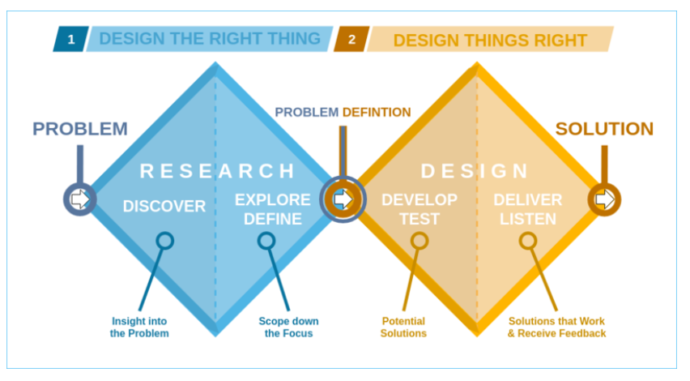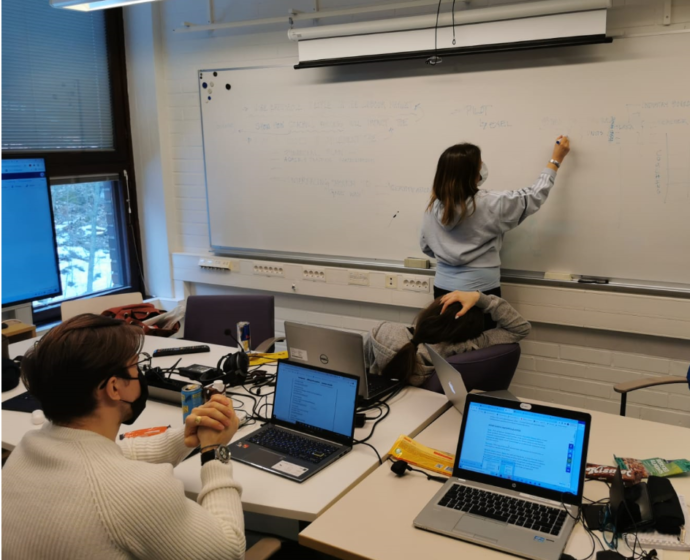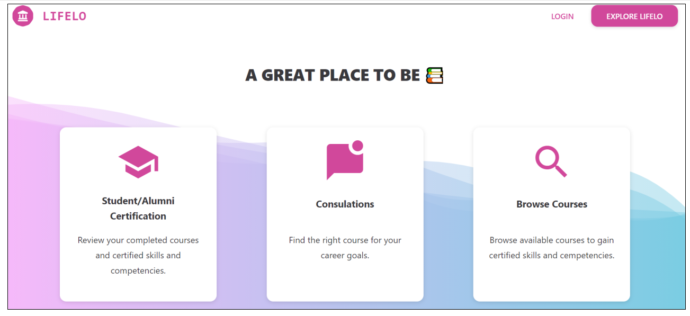The University of Applied Sciences of The Future was a joint hackathon event held from 17 February to 14 April 2021 organized by the Rectors’ Conference of Finnish Universities of Applied Sciences Arene and the University of Applied Sciences Students in Finland – SAMOK. (Tulevaisuudenamk 2021)
Students from different Universities of Applied Sciences in Finland applied for the hackathon in 4 themes: sustainable development, digitalization, continuous learning and changing work. The hackathon was a competition where twelve teams were chosen to present their final solutions. The best team won a prize of 3000 euros.
One of the participating teams were Laurea Service Business and Management students: Thomas Rogdakis, Isidora Sofronijevic, Uchechukwu Nwosu, Thomas Rogdakis, Anneli Matila-van Houtum and Maksim Minenko. The students decided to look for answers on how the Universities of Applied Sciences could support the students and alumni adapt the attitude of continuous learning through coaching and how to certify skills and competences of during and after the studies.
“A degree from a University of Applied Sciences is not enough: each of us has to develop or acquire new skills and knowledge during our careers. Nowadays, universities are expected to provide more than just degree-level education for working-age adults. The discussion on continuous learning highlights individual learning paths, with new elements being built on existing competences and changing needs.” (Tulevaisuudenamk 2021)
Integrating Hackathon competition into a study program
Senior lecturer Anna Nolvi suggested Laurea students to integrate their project into Service design (SD) course. Service design implementation consists of two separate sections, the first Theory Part (3 ECTS) is a prerequisite for the second Project Part (7 ECTS). Theory part is done online individually where students get familiar with service design theory such as the advantages of SD in developing services and organizations, main SD concepts, typical SD process and methodology, and human-centered mindset. The focus in the Project part is on practical implementation and application of the theoretical knowledge in a real work life project. The Project Part for the Hackathon team started on 17.2.2021 with a joint kick-off, followed by the service design phases outlined in the Double Diamond process and ended on 14.4.2021 with final pitch presentations. Laurea team presented their service idea called LIFELO.
Integration of Service Design theory to Hacked Lifelo Project
As Service Design aims to integrate various disciplines and methods in creating more suitable services for consumers, familiarizing with its theory was crucial in the team’s project development. Throughout the various stages in the project the team was able to use knowledge and resources gained in the Service Design course. The team followed the Service Design principles in developing the scope and features of the Lifelo service; a platform aiming to ease students experience in continues learning.
The Double Diamond is one of the most common processes used in Service Design as a basis and it is used in Laurea course implementation. The official Double Diamond design model has four stages: Discovery, Definition, Development and Delivery. Together, these stages work as road map designers can use to organize their thoughts in order to improve the creative process. This model was used also in the course with some modifications in the original suggested toolset. The team received guidance from Laurea lecturer Anna Nolvi and the Hackathon organizers.
 Picture: Double diamond design process. (source: https://www.designingbuildings.co.uk/wiki/Double_diamond_design_process)
Picture: Double diamond design process. (source: https://www.designingbuildings.co.uk/wiki/Double_diamond_design_process)
Discover Phase
In service design every project starts with an exploratory phase where insights and inspiration are gathered. In Discover-phase, the service design process begins with the world of the user, and tries to develop novel insights into the problems users encounter in everyday life. In this phase, the team conducted various desk research and field study to familiarize with current education.
Define Phase
In the Define Phase, designers make sense of what they had defined at previous stage. The students carried out series of surveys, interviews and consultations with students, alumni and staff of University of Applied Sciences to narrow down the scope of the problem. The team defined main problems such as students’ motivation, lack of connection between studies and real life, certification of transversal skills and alumni certification of new skills as well as imbalance between skills needed and skills offered.
Develop Phase
The Develop phase takes the initial design brief and through an iterative process of developing and testing, refines the service concept until it is ready for implementation. Laurea team together with a web developer Stelios Kamnakis created a prototype for the Lifelo platform. The prototype was tested with other students of Laurea University of Applied Sciences as well as several alumni. After the feedback, the new challenges were discovered. For example, the students and alumni were of the opinion that they don’t receive sufficient guidance in reaching their goals therefore a new service concept could be a specialized coaching.
This feature was added to the Lifelo platform prototype and the team carried out more testing in order to confirm the users would benefit more from coaching rather than guidance.
 Picture: Double diamond design process. (source: https://www.designingbuildings.co.uk/wiki/Double_diamond_design_process)
Picture: Double diamond design process. (source: https://www.designingbuildings.co.uk/wiki/Double_diamond_design_process)
Deliver Phase
In the Deliver phase, the service begins to address the needs identified in the Discover phase. The final concept is taken through final testing, finalised and signed off. The team tested the final implementation and received a consultation from the Director for Continuous Learning at Laurea University, Outi Perhiö, and the Development Manager, Mikael Uusi-Mäkelä. This consultation helped the team ensure the feasibility of the Lifelo SaaS platform. The final step of the project was to create a pitch following the NABC Method, as introduced in the Service Design course. The NABC Method aims to provide answers to what is the need, how the created solution satisfies this need, what benefits are brought to the target customers, and how the solution compares to the existing services.
 Picture. Screenshot of LIFELO prototype.
Picture. Screenshot of LIFELO prototype.
Final presentation took place online on 19.4.2021. Twelve teams presented videos of their pitch. All the videos can be seen at https://tulevaisuudenamk.fi/?lang=en
Final pitch script of Laurea team
We are Team 11 and we believe learning is a lifelong process and as such it requires continuous support and encouragement. That is why we created LIFELO, to support students, alumni and UAS on their journey of creating and being the work-force of the future. Our team has identified throughout research that untrained people are left behind in the labor market, skills retraining, and development is an expensive and time-consuming process. These reasons can halt adapting to the changes in the labor market.
LIFELO, a data-driven SaaS coaching platform tackles exactly these issues. It gives the opportunity for both students and alumni to book specialized coaching sessions with experts to help them unleash their full potential. After their coaching sessions they will have an integrated selection of all existing UAS courses in one place, which allow them to better evaluate and choose their options for development. LIFELO eliminates the need to run from one website to another, cutting down the research time and decision making by hours. You can enroll in all existing UAS course directly. Your potential recruiters will also be able to view all the skills you have acquired, in a clear and visualized way. And if you are feeling lost, just pop back to a coaching session and get the guidance you need.
The universities around Finland will be able to cooperate and connect with each other through LIFELO, thus bringing simpler and faster opportunities for the students and alumni to be able to educate and evolve, course by course. Having clear visuals showcasing the student’s and alumni’s skills, will give them a visual advantage to other applicants. In addition, providing what is necessary now and that is coaching, will bring the best out of the students and alumni and will aid them in finding the exact path in their professional career and wellbeing.
LIFELO is aimed primarily for students and alumni of UAS but it can be used by anyone eager to improve themselves. UAS will benefit a lot from LIFELO, it gives them a faster lane to reach the lucrative and mostly unguided alumni, more financial benefits, and a face lift.
Throughout the research we found that coaching is much more effective than tutoring or guidance, too many students and alumni are unhappy with guidance currently offered at UAS. Therefore, the platform offers specialized coaching, standardized online skills certification and easy one-step shopping to all courses available in UASs.
To bring our idea to life we need investments to get the SaaS platform up and running. Our estimations for the costs were made with consultation from experts in web developing and education, and the estimated costs for the platform are around 120 000e max. But most importantly, we need universities to become partners in solving these issues. We need universities and their expertise to pilot Lifelo.
We at LIFELO know exactly what students and alumni are going through. We’ve been there, and that is what inspired us to embark on this journey to offer support to students and alumni. With your help we can transform the education of today and support our students and alumni so they can match the needs of tomorrow. (Rogdakis em. 2021)
Learning outcomes from the participation in the HACK-ED – The future of education project
By attending the Service Design course, the team was equipped with the right information and tools to carry out the Hack-Ed Hackathon development project. Thomas Rogdakis, Isidora Sofronijevic, Uchechukwu Nwosu, Anneli Matila-van Houtum and Maksim Minenko are confident this knowledge will help them in future academic and professional endeavors. The team expressed their gratitude to the learning facilitator Anna Nolvi who offered her guidance, time and encouragement throughout this competition.
 Picture: Senior lecturer Anna Nolvi guiding the students. (picture by Paula Ikonen)
Picture: Senior lecturer Anna Nolvi guiding the students. (picture by Paula Ikonen)
Anna Nolvi and Laurea students are satisfied with the project’s outcome and were happy to participate in the Hackathon competition. In the beginning, the team saw the project as an extra opportunity to expand their network and work with motivated classmates and, most importantly, gain valuable experiences. They started to develop the idea from the student’s point of view and wanted to find ways to make University of Applied Sciences a better place. They came up with a platform where all needed information would be in one place and solving the problem of being overwhelmed with all the websites students must register in. Two additional features of their platform developed in further phases were skill certification and coaching based mentorship. The need of Lifelo service was backed up by analyzing many different interviews and questionnaires carried out with students, lecturers and Laurea’s development department. Having discussions about continuous learning with professionals in the educational sector was truly exciting and educational experience for Laurea students.
Laurea senior lecturer Anna Nolvi who guided Thomas Rogdakis, Isidora Sofronijevic, Uchechukwu Nwosu, Anneli Matila-van Houtum and Maksim Minenko starting from the application process, project implementation to the final presentation, is proud of the team and their commitment to the whole design process. Although this team didn’t win the Hackaton, Anna believes their voice was heard and the problems their presented noticed. As a coach of Service Design course at Laurea, Anna Nolvi, is very glad the Hackathon was integrated into students study program. The team met the objectives of the course and now after completing the whole study unit package they are able to describe how value is created for the customers through service, recognize the essence of service design thinking and methods plan, implement and evaluate a service design project using service design methods and apply creative problem-solving and develop working methods individually and in team. Anna is interested in guiding other Service Design projects that can be integrated into her courses. Real life project are exciting part of her job and both students and Anna learn a lot from collaboration with other specialists.
Sources:
- Tulevaisuuden amk. (16.4.2021). https://tulevaisuudenamk.fi/
- Rogdakis, Sofronijevic, Nwosu, Matila-van Houtum, Minenko. 2021. Final project report.
Additional links: